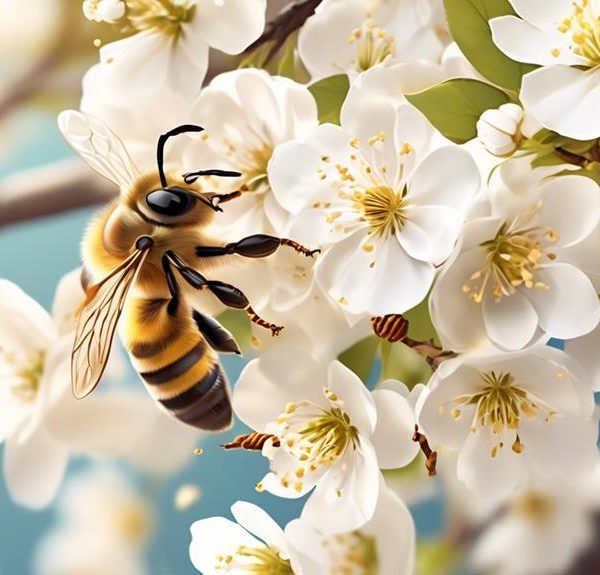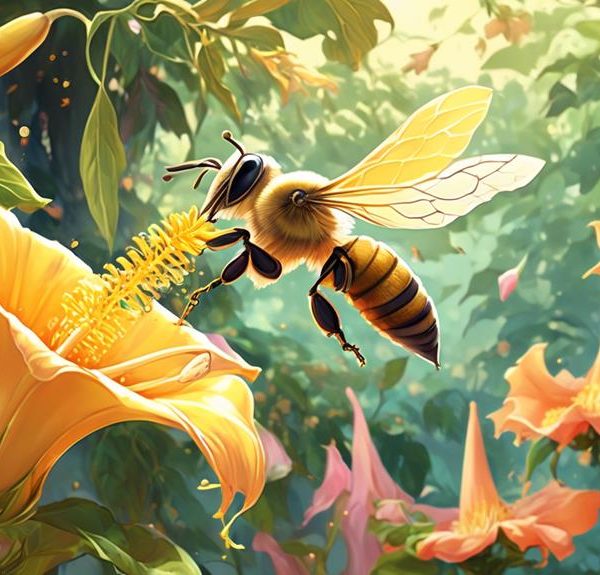Learn about the surprising relationship between bees and brown sugar, and how it impacts their behavior, health, and lifespan.
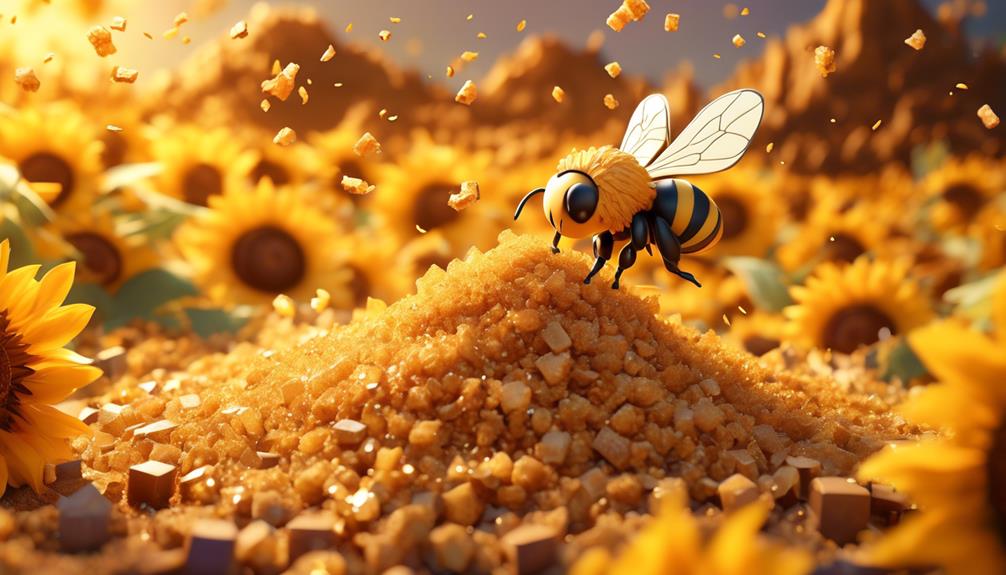
Do Bees Like Brown Sugar
Ever wondered if the theory that bees are attracted to brown sugar holds any weight? You're not alone. Many people have pondered over whether these industrious little creatures have a sweet tooth for this particular type of sugar.
It's a fascinating topic, one that opens up a broader discussion about bee behavior and their dietary preferences. As you venture further, you will uncover intriguing insights into the world of bees and their interactions with various forms of sugars, raising questions about what implications this could have on their health and lifespan.
Key Takeaways
- Bees are attracted to brown sugar when their preferred sources, such as flower nectar, are not available.
- Brown sugar contains minerals beneficial for bees' health, but it needs to be diluted in water to create a simple syrup for bees to consume.
- Bees prefer simple sugars that are easier to digest and metabolize, and the molasses present in brown sugar can be harmful if consumed in large quantities.
- Feeding bees with brown sugar can lead to malnutrition and weakened immune systems, especially if it replaces their natural nectar or specially formulated bee feed.
Understanding Bees' Dietary Preferences
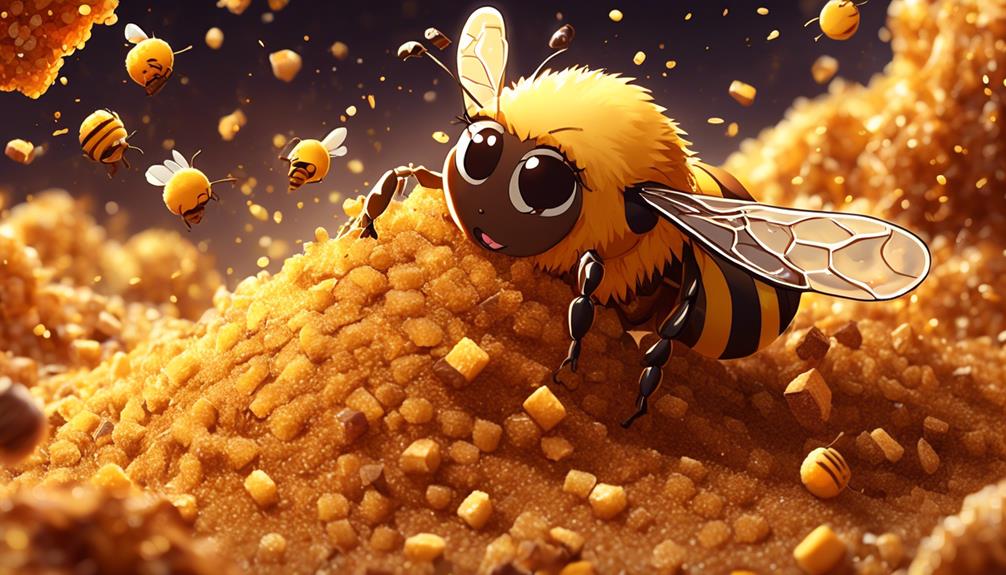
To fully comprehend bees' dietary preferences, it's crucial to delve into their natural attraction to various types of sugars, including brown sugar. It's not just about what's sweetest, but also about what's most accessible and beneficial for their survival. Bees nectar from flowers, but they're also known to be attracted to certain types of sugars humans use, like brown sugar.
You may be surprised to learn that the color and consistency of brown sugar aren't the main attractions for bees. Rather, it's the specific mix of sucrose, glucose, and fructose found in it. These sugars provide essential energy for bees' daily activities and honey production.
However, it's important to note that not all sugars are good for bees. Artificial sweeteners and processed sugars can harm their health. Brown sugar, while it can attract bees, isn't their top choice. Natural, unprocessed sugars found in flower nectar are their favorite. They're attracted to brown sugar when their preferred sources aren't available.
Understanding this gives you a deeper insight into bees and their dietary preferences. It also helps you appreciate the delicate balance of nature and the crucial role bees play in it.
Brown Sugar: A Closer Look
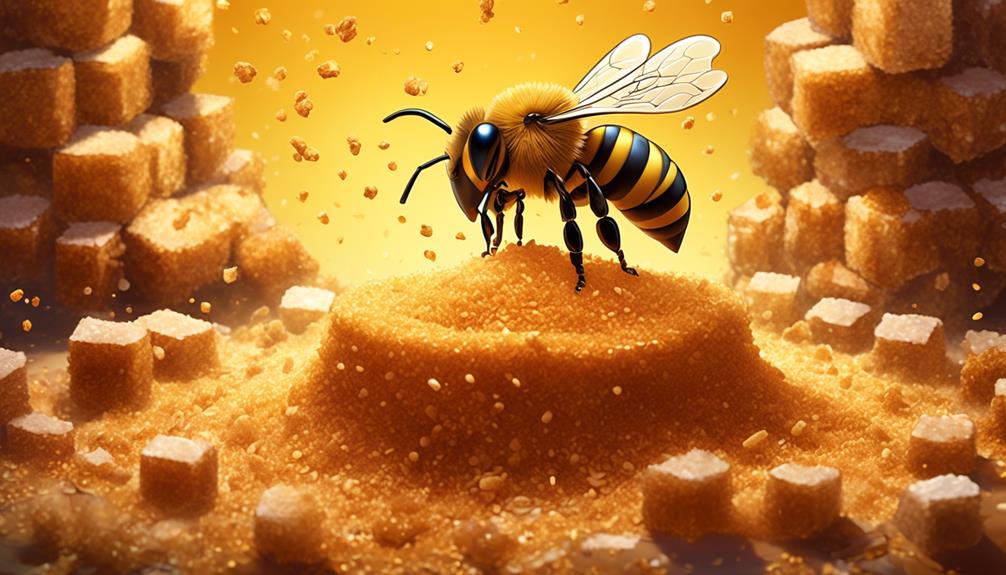
Now that you've grasped the importance of sugars, especially brown sugar, in the diet of bees, let's examine this sweetener more closely.
Brown sugar is a type of sugar that's moist, sticky, and has a distinctive brown color. It's the result of adding molasses back to white sugar, lending it a deep, rich flavor, and a color that ranges from light to dark brown.
This sugar isn't just sweet; it's also packed with minerals. The molasses in it provides calcium, iron, and potassium that are beneficial for bees' health. However, bees can't digest brown sugar directly. It needs to be diluted in water, creating a simple syrup that bees can easily consume.
But here's the catch. Although brown sugar is nutrient-dense, it's not the ideal food for bees. The fact is, bees require a balanced diet, just like us. Overfeeding them with brown sugar can lead to malnutrition. In the wild, bees get a variety of nutrients from different types of nectars. Therefore, while brown sugar can act as a temporary food source during scarcity, it shouldn't replace their natural diet.
How Bees Interact With Sugar
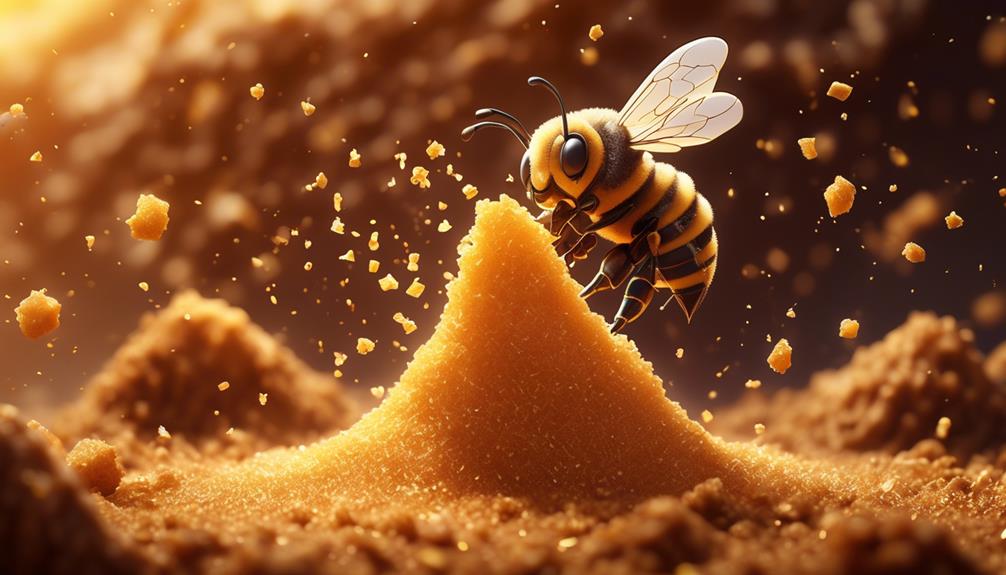
Understanding the interaction between bees and sugar takes us into the fascinating world of bee biology and behavior. Bees are drawn to sugar because it provides them with the energy they need to fly and forage. They primarily seek out nectar, a sweet liquid produced by plants, which they convert into honey in their hives.
But what happens when bees encounter table sugar or brown sugar?
Bees can indeed consume these types of sugar, but it's not their first choice. They're equipped with a proboscis, a kind of straw-like tongue, which they use to suck up liquids. They're not well-suited to consume solid sugar, but if it's dissolved in water, they'll drink it. However, they can't process it as efficiently as nectar.
Moreover, the type of sugar matters. Honey bees, for instance, prefer sucrose, which is found in both white and brown sugar. But brown sugar also contains molasses, which bees don't particularly like.
Do Bees Prefer Brown Sugar?
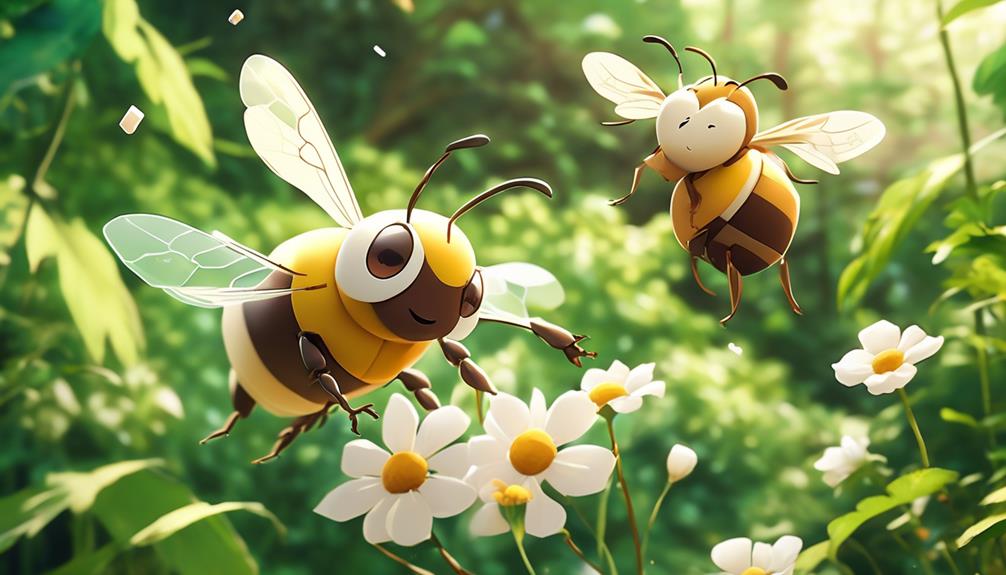
Despite their ability to consume brown sugar, do bees actually prefer it over other types of sugar, such as white sugar or nectar? Well, it's a complex issue.
You might think that because brown sugar has a more potent aroma and a richer flavor, bees would naturally gravitate towards it. However, studies have shown that bees don't necessarily have a preference for brown sugar over white. In fact, bees seem to prefer simple sugars that are easier for them to digest and metabolize, such as those found in white sugar and nectar.
Furthermore, the molasses present in brown sugar can sometimes be harmful to bees, particularly if consumed in large quantities. It can lead to digestive issues and even death in severe cases. So while bees can consume brown sugar, it isn't their preferred choice, and it might even be detrimental to their health.
In essence, while it's true that bees are capable of eating brown sugar, they don't necessarily prefer it. For bees, it's not about the taste or flavor, it's about survival. They need sugars that are easy to digest and metabolize, and unfortunately, brown sugar doesn't fit the bill.
Impact on Bee Health and Lifespan
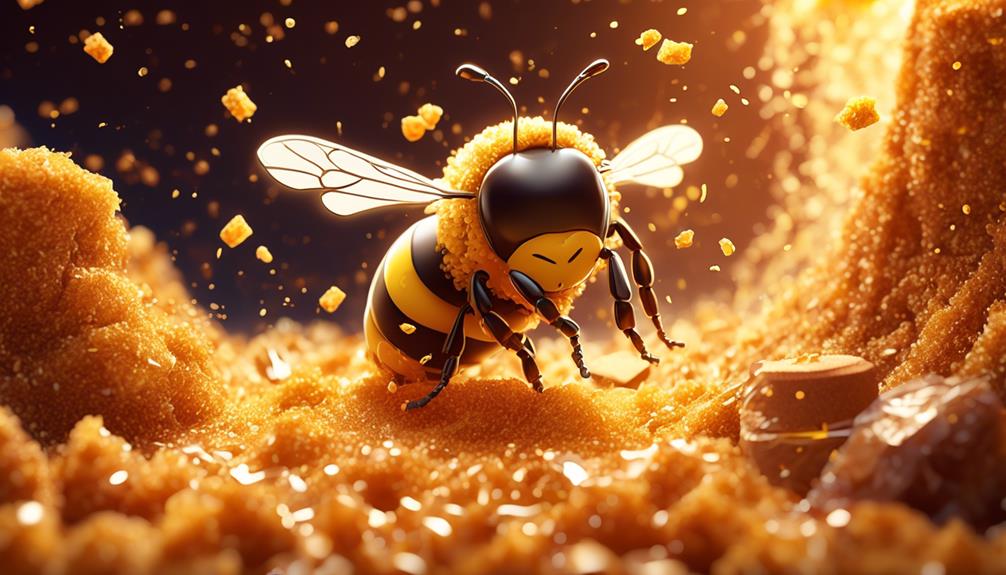
Feeding bees with brown sugar not only affects their health but can also significantly impact their lifespan. While brown sugar might be a quick and easy substitute for nectar, it's not the best nutritional choice for these tiny workers.
Brown sugar lacks the essential nutrients found in natural nectar or specially formulated bee feed. This lack of nutrients can lead to malnutrition, which in turn weakens the bees' immune systems, making them more susceptible to diseases and parasites. Over time, this can result in a decline in the overall health of the hive and a shortened lifespan for individual bees.
Moreover, the process of digesting brown sugar isn't easy for bees. It's harder on their digestive systems than natural nectar, which can lead to long-term health issues. This is especially true during colder months when bees are more reliant on stored food sources.
Frequently Asked Questions
What Other Sweet Substances Are Bees Attracted to Besides Sugar?
You're curious about what sweet substances attract bees, besides sugar.
Well, bees are quite drawn to various types of sweet nectar, particularly from flowers. They're also attracted to tree sap, fruits, and some sweet human foods if available.
Honey, of course, is another favorite. It's important to note though, offering bees artificial sweeteners can harm them, so it's best to let them find their own natural sources.
How Does the Color of the Sugar Affect the Bees' Attraction to It?
You're asking about the impact of sugar color on bees' attraction.
Bees don't really care about the color, they're more into the sweet scent and taste.
So, whether it's white, brown, or raw sugar, if it's sweet, they'll be drawn to it.
Remember, though, artificial sweeteners won't work. They don't have the same scent or taste.
It's all about the sweetness for these little pollinators, not the aesthetics.
Can Bees Distinguish Between Artificial and Natural Sugars?
Yes, bees can distinguish between artificial and natural sugars. Their complex sense of taste enables them to prefer natural sugars, like those in nectar.
Artificial sugars often lack the nutrients they need. So, while they might be attracted to the sweetness, they won't find it as satisfying or beneficial.
It's a bit like you choosing a fresh, juicy apple over a candy bar – both are sweet, but one's naturally healthier.
What Are the Environmental Impacts of Bees Consuming Brown Sugar?
When bees consume brown sugar, it can disrupt their natural diet. You see, they're designed to process nectar, not refined sugars. Over time, this can weaken their immune systems, making them more susceptible to diseases and pests.
Additionally, if bees are foraging less because they're feeding on sugar sources, they're not pollinating as much. This can have a significant impact on our ecosystem, as many plants rely on bees for pollination.
How Does the Consumption of Brown Sugar Affect the Honey Production Process in Bees?
When bees consume brown sugar, it can disrupt their honey production process. They're designed to process natural nectar, not processed sugars. This substitution could lead to nutritional deficiencies, affecting their health and productivity.
It might even alter the taste and quality of the honey they produce. So, while they'll eat it if it's there, it's not the best choice for their diet or for maintaining the quality of their honey.
Conclusion
In conclusion, bees don't exactly prefer brown sugar. It's more about the nectar's sugar content. While they can consume brown sugar, it isn't their first choice and may negatively impact their health and lifespan.
It's always best to leave it to Mother Nature to provide bees with their preferred diet. So, next time you see a bee, maybe skip the brown sugar and let them find their own, healthier treat!

